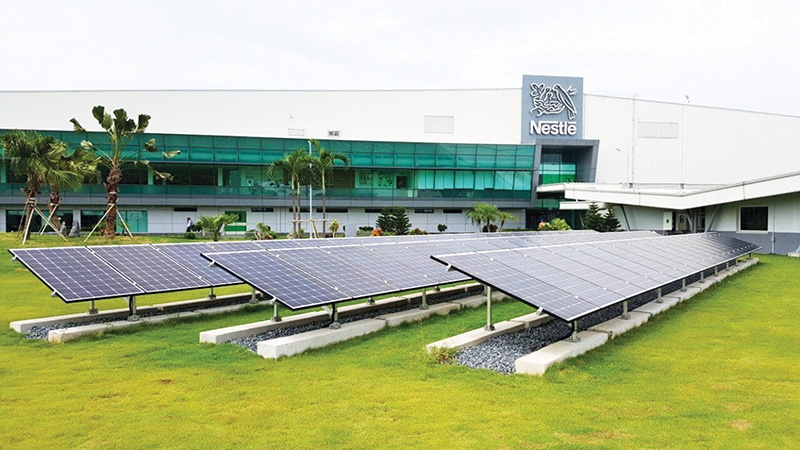Nestlé doubles efforts against climate change
 |
| Nestlé is determined to realise its targets for a zero-waste and carbon-neutral future |
Nestlé officially last week published a net-zero roadmap detailing the scope of the new targets and its plans for meeting them. The targets have been aligned with limiting global temperature rise to 1.5°C above pre-industrial levels and reaching net-zero emissions by no later than 2050, based on the Science-Based Targets initiative.
Nestlé’s group chairman Paul Bulcke said, “Our company recognises the strategic importance of taking decisive measures to address climate change and supports accelerating and scaling up our work to ensure long-term success to contribute to a sustainable future for generations to come.”
Nestlé’s work to get to net zero spans the three main areas of regenerative agriculture, in operations, and product porfolio.
In Vietnam, Nestlé is working with farmers to support them in implementing regenerative agriculture practices. The Nescafé Plan, launched 10 years ago, has so far distributed more than 46 million plantlets of high-yielding and disease-resistant coffee varieties to growers in the five Central Highlands provinces of Dak Lak, Dak Nong, Gia Lai, Lam Dong, and Kon Tum. This has helped to renew over 46,000 hectares of aged and low-productive coffee areas and provides strong support to the government’s coffee rejuvenation programme. The sustainable coffee initiative helps protect the natural environment through reducing irrigated water usage by 40 per cent and chemical fertiliser and pesticide use by 20 per cent.
After a decade, Nescafé Plan has supported more than 21,000 coffee farms to achieve the 4C, the Common Code for the Coffee Community, certification. In return, Nestlé is purchasing 20-25 per cent of the country’s total coffee output, making it the leading coffee buyer in Vietnam. Nescafé Plan also supports local communities by injecting around $600-$700 million per year into the rural economy through coffee purchases.
In its operations, Nestlé expects to complete the transition of its 800 sites in the 187 countries where it operates to 100 per cent renewable electricity within the next five years. The company is switching its global fleet of vehicles to lower emission options and will reduce and offset business travel by 2022. It is also implementing water protection and regeneration measures and tackling food waste in its operations.
In Vietnam, the company has adopted renewable energy for all production sites which has been contributing to a reduction of 60 per cent in CO2 emissions in the past 10 years.
All of the company’s factories have also achieved the “Zero Waste to Landfill” goal since 2017, meaning that nothing leaving the factories goes to the landfill. In this process, Nestlé applied initiatives such as using coffee husk as fuel, ash as fertiliser, waste for making bricks, and wastewater for watering, among others to increase renewable energy.
Nestlé Vietnam is committed to driving the circular economy by strengthening sustainability across its operations. To facilitate the goal, Nestlé Vietnam and La Vie, a member of Nestlé Group, have joined the Packaging Recycling Organization Vietnam (PRO Vietnam). Accordingly, Nestlé Vietnam and other member companies under PRO Vietnam are taking a series of concrete actions to materialise the targets of recycling or reusing all of their packaging by 2025, along with the vision for a zero-waste future.
Within its product portfolio, Nestlé is continuously expanding its offerings of plant-based food and beverages, and is reformulating products to make them more eco-friendly. The company is increasing the number of ‘carbon neutral’ brands to contribute to the fight against climate change. Garden Gourmet plant-based food as well as Garden of Life supplements will achieve carbon neutrality by 2022, while Sweet Earth plant-based food, among other brands, aim for the same by 2025. These product lines come on top of Nespresso, S. Pellegrino, Perrier, and Acqua Panna’s commitment to carbon neutrality by 2022, with the rest of the Nestlé’s waters achieving the same by 2025.
The company expects to invest a total of CHF3.2 billion ($3.59 billion) over the next five years to accelerate its work worldwide, including CHF1.2 billion ($1.35 billion) to spark regenerative agriculture across the company’s supply chain.
Binu Jacob, managing director of Nestlé Vietnam, said that they are committed to long-term investment and sustainable development in Vietnam. With the “Creating Shared Value” approach as its core business practice, the company closely teams up with Vietnamese farmers, industry partners, governments, non-governmental organisations, and consumers to reduce its environmental footprint.
“With sustainability being our global commitment and top priority, Nestlé Vietnam focuses on three interconnected areas, including tackling climate change, shaping a waste-free future, and promoting gender balance,” he said.
“By these efforts, Nestlé Vietnam has been among the top companies with outstanding sustainable development practices in Vietnam for years. Nestlé Vietnam has recently co-chaired the Vietnam Business Council for Sustainable Development and will take an active role in encouraging the business community to participate and contribute to the sustainable development of the country,” Jacob added.
What the stars mean:
★ Poor ★ ★ Promising ★★★ Good ★★★★ Very good ★★★★★ Exceptional
Related Contents
Latest News
More News
- Masan Consumer names new deputy CEO to drive foods and beverages growth (February 23, 2026 | 20:52)
- Myriad risks ahead, but ones Vietnam can confront (February 20, 2026 | 15:02)
- Vietnam making the leap into AI and semiconductors (February 20, 2026 | 09:37)
- Funding must be activated for semiconductor success (February 20, 2026 | 09:20)
- Resilience as new benchmark for smarter infrastructure (February 19, 2026 | 20:35)
- A golden time to shine within ASEAN (February 19, 2026 | 20:22)
- Vietnam’s pivotal year for advancing sustainability (February 19, 2026 | 08:44)
- Strengthening the core role of industry and trade (February 19, 2026 | 08:35)
- Future orientations for healthcare improvements (February 19, 2026 | 08:29)
- Infrastructure orientations suitable for a new chapter (February 19, 2026 | 08:15)

 Tag:
Tag:



















 Mobile Version
Mobile Version